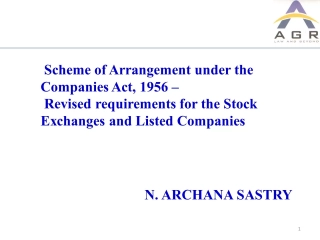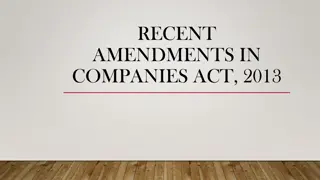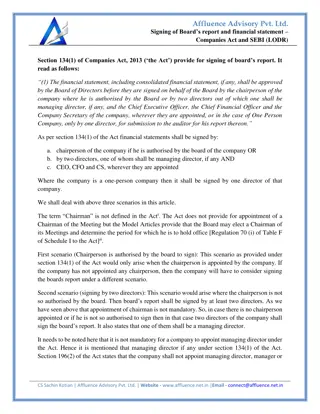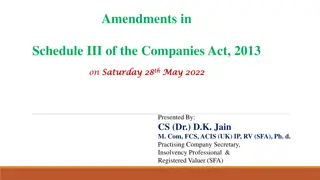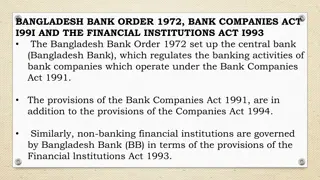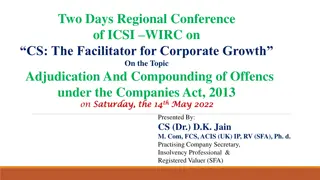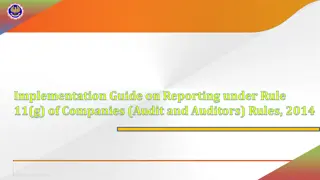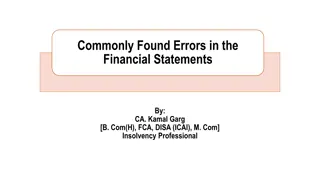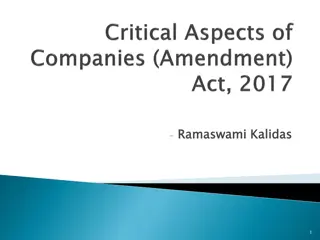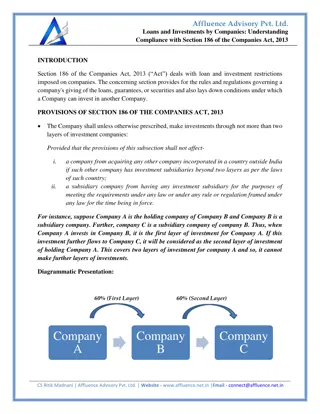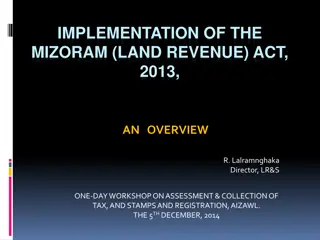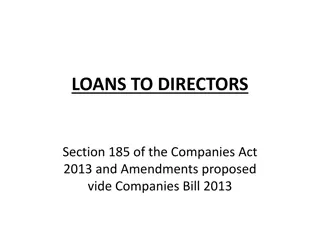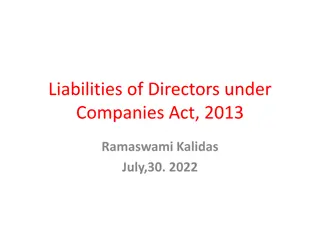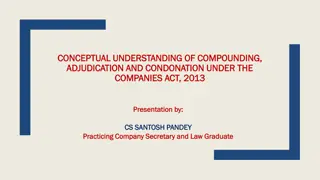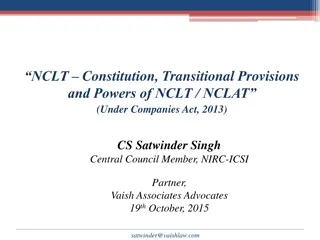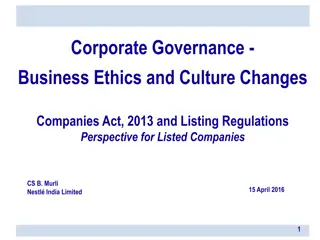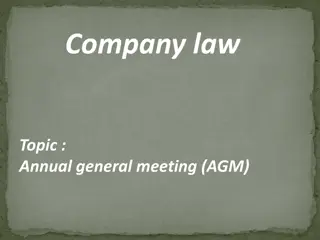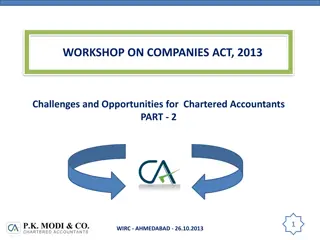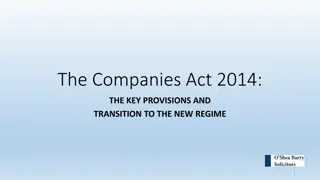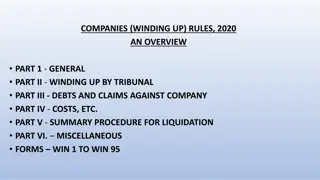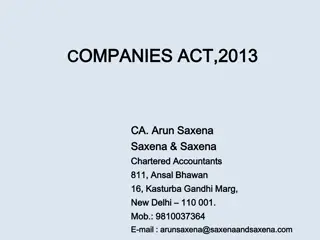Scheme of Arrangement under the Companies Act, 1956
The changes introduced in the existing procedures for stock exchanges and listed companies regarding the scheme of arrangement under the Companies Act, 1956. It covers the submission of draft schemes, display on websites, changes in internal procedures, court process, approval of shareholders, and i
4 views • 16 slides
Important Provisions of Companies Act Regarding Audit
The Companies Act mandates specific provisions related to audit, including the appointment of auditors, consent, certificates, and rotation requirements. Companies need to appoint auditors timely, obtain consent and eligibility certificates before appointment, and adhere to mandatory auditor rotatio
2 views • 22 slides
Buyback of Shares in India under Companies Act & Tax Consideration
Explore the intricacies of share buybacks in India, from regulatory compliance under the Companies Act to tax considerations under the Income-tax Act. Discover how companies navigate legal frameworks to optimize surplus cash, enhance shareholder value, and strengthen promoter holdings through strate
6 views • 4 slides
Blog 2- Unveiling the Top RPO Companies in the USA_ Elevate Your Recruitment Strategy
In the competitive landscape of talent acquisition, companies are increasingly turning to Recruitment Process Outsourcing (RPO) providers to streamline their hiring processes and gain access to top talent. With a myriad of RPO companies in the USA, it can be challenging to identify the best partners
6 views • 2 slides
The Impact of Sections 143(9) and 143(10) of Companies Act, 2013
Exploring the significance of Sections 143(9) and 143(10) of the Companies Act, 2013, and their implications on active regulators, worried investors, and normal auditors. The session delves into defending past audits, highlights auditing standards in India, and provides insights into regulators' obs
0 views • 54 slides
Recent Amendments in Companies Act, 2013: An Overview
The Companies Act, 2013, a significant legislation in India, underwent amendments to enhance corporate governance and compliance. Passed in 2012, the Act regulates aspects of corporate entities, fostering transparency and accountability. The amendments aim to adapt to evolving business landscapes an
0 views • 123 slides
Signing of Board’s report and financial statement – Companies Act and SEBI
Section 134(1) of the Companies Act, 2013 outlines specific guidelines for signing a board's report. This article delves into the various scenarios based on company structure, ensuring you understand who is required to sign. Stay informed and complia
0 views • 4 slides
Significant Amendments in Schedule III of the Companies Act, 2013
Schedule III of the Companies Act, 2013 has been amended to include instructions for the preparation of financial statements for different categories of companies. Key changes relate to rounding off figures based on total income, definition of turnover, and disclosure requirements for shareholding o
0 views • 29 slides
Banking Regulations in Bangladesh: A Comprehensive Overview
The Bangladesh Bank Order of 1972 established the central bank, Bangladesh Bank, which regulates banking activities under the Bank Companies Act of 1991. This legislation, along with the Financial Institutions Act of 1993, sets the framework for overseeing bank companies and non-banking financial in
2 views • 27 slides
Conference on Adjudication and Compounding of Offences under Companies Act, 2013
The Two Days Regional Conference of ICSI WIRC focusing on the facilitation of corporate growth through discussions on adjudication and compounding of offences under the Companies Act, 2013. The event, presented by CS (Dr.) D.K. Jain, covers topics like fraud, wrongful gain and loss, punishment for f
0 views • 51 slides
Different Types of Companies in Business
Explore the various kinds of companies in the business world, including statutory companies, registered companies, private companies, public companies, and more. Learn about the differences between private and public companies, statutory company examples like LIC and RBI, and the characteristics of
0 views • 25 slides
Overview of Valuation Requirements under Companies Act, 2013 & IBC 2016
This text provides insights into the valuation requirements stipulated by the Companies Act, 2013 and the Insolvency and Bankruptcy Code, 2016. It includes sections demanding valuation reports from registered valuers, such as for share capital issues, audit committee terms, director transactions, cr
0 views • 54 slides
Implementation Guide on Reporting under Rule 11(g) of Companies (Audit and Auditors) Rules, 2014
This comprehensive guide covers the provisions, objective, and important terms related to reporting under Rule 11(g) of Companies (Audit and Auditors) Rules, 2014. It discusses the importance of maintaining proper books of accounts, introduces the concept of audit trail, explains crucial terms like
2 views • 49 slides
Common Errors in Financial Statements and Legal Requirements Under Companies Act, 2013
Explore commonly found errors in financial statements and the legal requirements under the Companies Act, 2013, focusing on the correct presentation of company affairs, compliance with accounting standards, and proper disclosure of useful lives for depreciation on property, plant, and equipment. Und
0 views • 60 slides
Insights into the Biotech Industry: Companies, Key Players, and Career Pathways
Keith Ho's career journey from a scientist to a digital health expert at Biogen is highlighted. The overview covers the definition of biotech, the concentration of biotech companies in the US, and the global distribution of such companies. Additionally, key insights into the top biopharma companies
0 views • 9 slides
Proposed Changes in Company Regulations under The Companies Act
The proposed changes under The Companies Act include redefining terms like "significant influence" and "joint venture," aligning accounting years for associate companies, modifying the definition of net worth, and more. These revisions aim to enhance clarity and efficiency in corporate regulations.
0 views • 50 slides
An Overview of Different Types of Companies and Their Characteristics
Explore the various kinds of companies based on mode of incorporation, number of members, liability of members, and more. Learn about statutory companies, registered companies, private companies, and the distinctions between different types of companies in the business world.
0 views • 25 slides
Charges and Registration according to Companies Act, 2013
This comprehensive content covers the concepts of charges, registration of charges, fee structures, and penal provisions as per the Companies Act, 2013. It explains the duty of companies, fee structures for charges created before and after specific dates, and the importance of timely registration to
1 views • 12 slides
Loans and Investments by Companies -Understanding Compliance with Section 186
Section 186 of the Companies Act, 2013, outlines strict rules for company loans and investments. This section ensures companies adhere to legal limits, obtain necessary approvals, and maintain transparency in financial dealings. Understanding these c
0 views • 5 slides
Charges and Mortgages in Property Transactions
According to the Transfer of Property Act and Companies Act, charges and mortgages play significant roles in property transactions. This content explains the definitions of charges and mortgages, their distinctions, registration requirements, and the duty of companies to register charges. It covers
0 views • 22 slides
Overview of the Mizoram Land Revenue Act, 2013
The Mizoram Land Revenue Act, 2013 replaced several previous regulations and came into effect on June 1, 2013. It establishes authorities for land management, outlines control and powers over land, and provides guidelines for land allotment for specific purposes. The Act designates the Government of
0 views • 18 slides
Disqualification and Vacation of Office of Directors in Companies Act, 2013
Directors play a crucial role in companies per the Companies Act, 2013. They must adhere to specific qualifications and can face disqualification under Section 164, such as being of unsound mind, insolvent, convicted of offenses, or failing to comply with court orders. Understanding these regulation
0 views • 42 slides
Section 185: Prohibition on Loans to Directors in Companies Act 2013
Section 185 of the Companies Act 2013 prohibits companies from directly or indirectly providing loans, guarantees, or securities to their directors or related persons. The rationale behind this regulation is to prevent misuse of public funds, siphoning off money, and securing personal gains. This se
0 views • 22 slides
Liabilities of Directors under Companies Act, 2013
Director's liabilities under the Companies Act, 2013 include definitions of directors, shadow directors, officers, and those in default. Responsibility for default and potential prosecutions for wrongful actions are discussed. Changes in definitions and concepts are highlighted to illustrate the leg
0 views • 37 slides
Compounding, Adjudication, and Condonation under the Companies Act, 2013
This presentation by CS Santosh Pandey covers the conceptual understanding of compounding, adjudication, and condonation under the Companies Act, 2013. It explains the purpose of company law, compounding of offences, condonation of delay, adjudication of penalties, and differences between them. Addi
0 views • 48 slides
The Foundations of the Separation of Powers in Companies
The separation of powers in companies is based on the dualism of organs: the Board and General Meeting. The actual situation in companies diverges between large public companies with autonomous management and smaller private companies with owner-operators. The search for the foundations of the separ
1 views • 15 slides
Types of Companies in Corporate Administration
This article discusses the various kinds of companies in corporate administration, including incorporated, chartered, statutory, and registered companies. It covers the definition of a company, different types of legal entities, and examples of each type. The classification of companies based on inc
0 views • 17 slides
Evolution of NCLT and NCLAT Under Companies Act, 2013
The establishment and constitutional validity of the National Company Law Tribunal (NCLT) and National Company Law Appellate Tribunal (NCLAT) under the Companies Act, 2013 were upheld in a landmark judgment by the Supreme Court. The NCLT marks a new era in corporate adjudication, taking over jurisdi
0 views • 41 slides
Corporate Transparency Act (CTA) Beneficial Ownership Reporting Requirements
The Corporate Transparency Act (CTA) mandates companies to report information about their beneficial owners to FinCEN starting January 1, 2024, to combat illicit activities. Reporting companies include U.S.-based corporations, LLCs, and foreign companies registered to do business in the U.S. Exempt
0 views • 10 slides
Impact of Corporate Transparency Act on Businesses
The Corporate Transparency Act (CTA), part of the Anti-Money Laundering Act of 2020, aims to prevent money laundering and other illegal activities by disclosing beneficial owners of US entities. The act mandates reporting companies to provide ownership information to the US Treasury's FinCEN. Exempt
0 views • 37 slides
Borrowing Powers of Companies under Companies Act, 2013
The term "Borrowing" in the Companies Act, 2013, pertains to the power granted in Section 180(1)(c) for companies to borrow money with the consent of the company by a special resolution. This includes provisions on limits, definitions of temporary loans, necessary board resolutions, and validity of
1 views • 8 slides
Corporate Governance and Business Ethics in Listed Companies: Regulations and Perspectives
Corporate governance and business ethics are integral to the success of listed companies, with a focus on internalized values, self-governance, and adherence to moral principles. Key areas include code of conduct, compliance, dealings with related parties, and vigil mechanisms. The Companies Act, 20
0 views • 18 slides
Annual General Meetings in Company Law
An Annual General Meeting (AGM) is a significant yearly gathering of a company's shareholders where directors present financial reports and shareholders vote on key matters. This article discusses the importance, requirements, procedures, and penalties associated with AGMs in company law, comparing
0 views • 28 slides
Challenges and Opportunities for Chartered Accountants under Companies Act, 2013
Explore the various penalties and punishments for defaults under the Companies Act, 2013 as discussed in a workshop held on 26th October 2013 in Ahmedabad. The session covered offenses such as misleading statements in prospectuses, fraudulent inducements, and fictitious applications for securities,
0 views • 33 slides
Campus Sexual Violence Elimination Act (SAVE) at California Lutheran University
Campus Sexual Violence Elimination Act (SAVE) was passed in March 2013 as part of the Violence Against Women Reauthorization Act, impacting institutions of higher education like California Lutheran University (CLU). The act mandates CLU to educate its community on prevention/awareness of sexual viol
1 views • 22 slides
Transitioning to The Companies Act 2014: Key Provisions and Changes
The Companies Act 2015, enacted on June 1, 2015, consolidates existing company laws from 1908 to 2013 into a single unified body of legislation. This comprehensive act aims to simplify company law, modernize corporate governance, and reduce administrative burdens. Companies need to decide on suitabl
0 views • 29 slides
Recent Case Laws in Corporate Laws - Economy Hotels India Services Pvt. Ltd. v. Registrar of Companies & ANR. (NCLAT)
In this case, Economy Hotels India Services Pvt. Ltd. filed a petition under Section 66 of the Companies Act for confirming the reduction of share capital. The National Company Law Tribunal (NCLT) rejected the application, but the National Company Law Appellate Tribunal (NCLAT) allowed the reduction
0 views • 21 slides
Analysis of Course Sections Overfilled in Spring and Fall 2013
Analysis of the percentage of course sections overfilled in Spring and Fall 2013 shows a range of rates across various subjects. Spring 2013 had a higher percentage of overfilled course sections compared to Fall 2013. The comparison between Spring and Fall 2013 courses indicates notable disparities
0 views • 8 slides
Companies (Winding Up) Rules, 2020: An Overview
The Companies (Winding Up) Rules, 2020 provide guidelines for winding up a company by the Tribunal under the Companies Act, 2013. The rules cover various aspects such as modes of winding up, circumstances under which a company may be wound up by the Tribunal, definitions, forms, and more. It specifi
1 views • 110 slides
Overview of Oppression and Mismanagement Provisions under Companies Act, 2013
This content provides detailed information about the provisions related to oppression and mismanagement as per the Companies Act, 2013. It outlines the eligibility criteria for members of shareholders to raise concerns, the power of the tribunal to intervene, and the possible orders that can be pass
0 views • 6 slides
